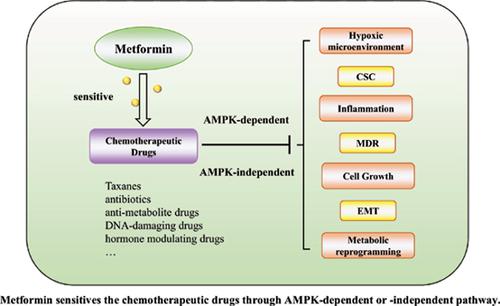Anti-Cancer Agents in Medicinal Chemistry ( IF 2.6 ) Pub Date : 2021-05-01 , DOI: 10.2174/1871520620666200918102642 Zhimin Tang 1 , Nan Tang 2 , Shanshan Jiang 3 , Yangjinming Bai 2 , Chenxi Guan 1 , Wansi Zhang 1 , Shipan Fan 4 , Yonghong Huang 1 , Hui Lin 1 , Ying Ying 1

|
Chemoresistance, which leads to the failure of chemotherapy and further tumor recurrence, presents the largest hurdle for the success of anti-cancer therapy. In recent years, metformin, a widely used first-line antidiabetic drug, has attracted increasing attention for its anti-cancer effects. A growing body of evidence indicates that metformin can sensitize tumor responses to different chemotherapeutic drugs, such as hormone modulating drugs, anti-metabolite drugs, antibiotics, and DNA-damaging drugs via selective targeting of Cancer Stem Cells (CSCs), improving the hypoxic microenvironment, and by suppressing tumor metastasis and inflammation. In addition, metformin may regulate metabolic programming, induce apoptosis, reverse Epithelial to Mesenchymal Transition (EMT), and Multidrug Resistance (MDR). In this review, we summarize the chemosensitization effects of metformin and focus primarily on its molecular mechanisms in enhancing the sensitivity of multiple chemotherapeutic drugs, through targeting of mTOR, ERK/P70S6K, NF-κB/HIF-1α, and Mitogen- Activated Protein Kinase (MAPK) signaling pathways, as well as by down-regulating the expression of CSC genes and Pyruvate Kinase isoenzyme M2 (PKM2). Through a comprehensive understanding of the molecular mechanisms of chemosensitization provided in this review, the rationale for the use of metformin in clinical combination medications can be more systematically and thoroughly explored for wider adoption against numerous cancer types.
中文翻译:

二甲双胍在抗癌治疗中的化疗增敏作用
化疗耐药会导致化疗失败和进一步的肿瘤复发,是抗癌治疗成功的最大障碍。近年来,二甲双胍作为广泛使用的一线抗糖尿病药物,因其抗癌作用越来越受到人们的关注。越来越多的证据表明,二甲双胍可以通过选择性靶向癌症干细胞(CSC)来提高肿瘤对不同化疗药物的反应,例如激素调节药物、抗代谢药物、抗生素和DNA损伤药物,从而改善缺氧微环境,并通过抑制肿瘤转移和炎症。此外,二甲双胍还可以调节代谢程序、诱导细胞凋亡、逆转上皮间质转化 (EMT) 和多药耐药性 (MDR)。在这篇综述中,我们总结了二甲双胍的化疗增敏作用,并主要关注其通过靶向mTOR、ERK/P70S6K、NF-κB/HIF-1α和丝裂原激活蛋白激酶来增强多种化疗药物敏感性的分子机制。 (MAPK) 信号通路,以及下调 CSC 基因和丙酮酸激酶同工酶 M2 (PKM2) 的表达。通过对本综述提供的化学增敏分子机制的全面了解,可以更系统、更彻底地探索在临床联合用药中使用二甲双胍的基本原理,以更广泛地应用于多种癌症类型。





























 京公网安备 11010802027423号
京公网安备 11010802027423号